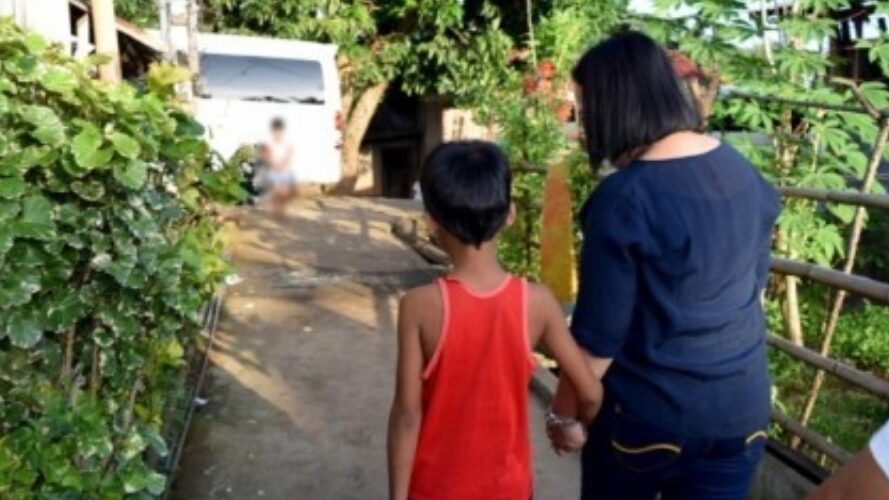Three Operations in Four Days Bring Ten Children to Freedom
Online Sexual Exploitation of Children (OSEC)
As the sun’s first light filtered into a nondescript home in Tacloban City, Philippines, an adult spent the early hours chatting online. What she was doing looked harmless but was in fact repulsive: offering to take money from foreigners to stream live sexual abuse of children in her house. But on that day, no children would be abused. Agents from the Philippine National Bureau of Investigations (NBI) arrived to arrest the suspected trafficker and two others. The children were safe.
This was just one of three operations that resulted in ten children rescued. That’s ten children now safe from being sexually abused on camera for foreigners to see. They are now receiving aftercare and social services.
The reality of cybersex trafficking is devastating: Pedophiles located around the world can pay to watch and direct live sexual abuse of young boys and girls online. Victims can be exploited anywhere with a computer and a webcam—but the abuse is anything but virtual. The traumatic effects on children are devastating, from the sex acts they are made to perform on camera, and the betrayal by trusted caregivers.
Simultaneous Operations Bring Children Out of Exploitation
While NBI agents were arresting the suspects and rescuing victims from the home in Tacloban City, a separate group of agents implemented a court-ordered search warrant in the nearby province of Biliran, where they believed other children were also exploited. In total, 10 children and four adults were rescued by the authorities—the youngest of whom was only 4 years old. Three suspects—including two of the victims’ older sister and her live-in boyfriend—were arrested. If convicted, they face a mandatory sentence of life imprisonment for human trafficking.
Both cases originated with a referral from the UK to Philippine law enforcement after UK citizen Alain Charlwood-Collings was convicted in May 2017 for sexual offenses against Filipino children, including sexual abuse and child pornography. Charlwood traveled to the Philippines to abuse children in person, and continued directing the abuse online once he returned to the UK.
Evidence revealed far-reaching networks of child victims and Filipino traffickers who would find children and arrange the exploitation. When Charlwood was arrested, the UK police found an extensive amount of child sexual abuse material in his possession, including 104 hours of footage of sexual abuse of Filipino children. He is now serving an 18-year sentence in the UK.
Fighting this complex crime requires close collaboration between international law enforcement and Filipino authorities to ensure that criminals are caught and brought to justice on both sides of the exploitation—from traffickers and recruiters in remote regions of the Philippines, to foreign customers in the U.S., Europe, Canada and Australia.
NBI’s Chief of the Anti-Trafficking Division, Janet Francisco, hailed the successful operations.
“The arrest and rescues we made today…should send a clear message that online sexual exploitation of children will not be tolerated anywhere in the Philippines,” she said.
Three-Year-Old Boy Safe, Mother Arrested
While NBI agents interviewed the rescued survivors and combed through evidence taken from the two homes, IJM and another Philippine law enforcement unit were planning to rescue more child victims just outside of Cebu City. On Monday, February 26, police brought a 3-year-old boy to safety and arrested his own mother, who was caught in the act of offering to live-stream his sexual abuse online. He is now safe in the protection and care of social workers, and police continue to search for more children who are believed to be victims of this suspect.
Reflecting on the three successful operations, IJM’s Field Office Director in Cebu, John Tanagho, shared, “Cybersex trafficking of children is a rampant form of violence devastating the lives of young Filipino children. These three operations in four days are a reminder that there is much progress in the fight against cybersex trafficking, and IJM is committed to supporting our law enforcement partners to rescue and protect traumatized Filipino children across the country.”
Journey to Healing
IJM staff and social workers from the Philippine Department of Social Welfare and Development supported each operation, explaining to the traumatized victims what was happening—that they were safe. The rescued survivors are now in the care of government social workers, and IJM’s team will work closely with aftercare partners to help these children heal from the abuse and exploitation. We will also support public prosecutors in pursuing justice against the arrested traffickers in court.
“It will take a coordinated global response to combat cybersex trafficking. I’m confident that as accountability replaces impunity, more Filipino children will be protected from this global crime,” Tanagho says.